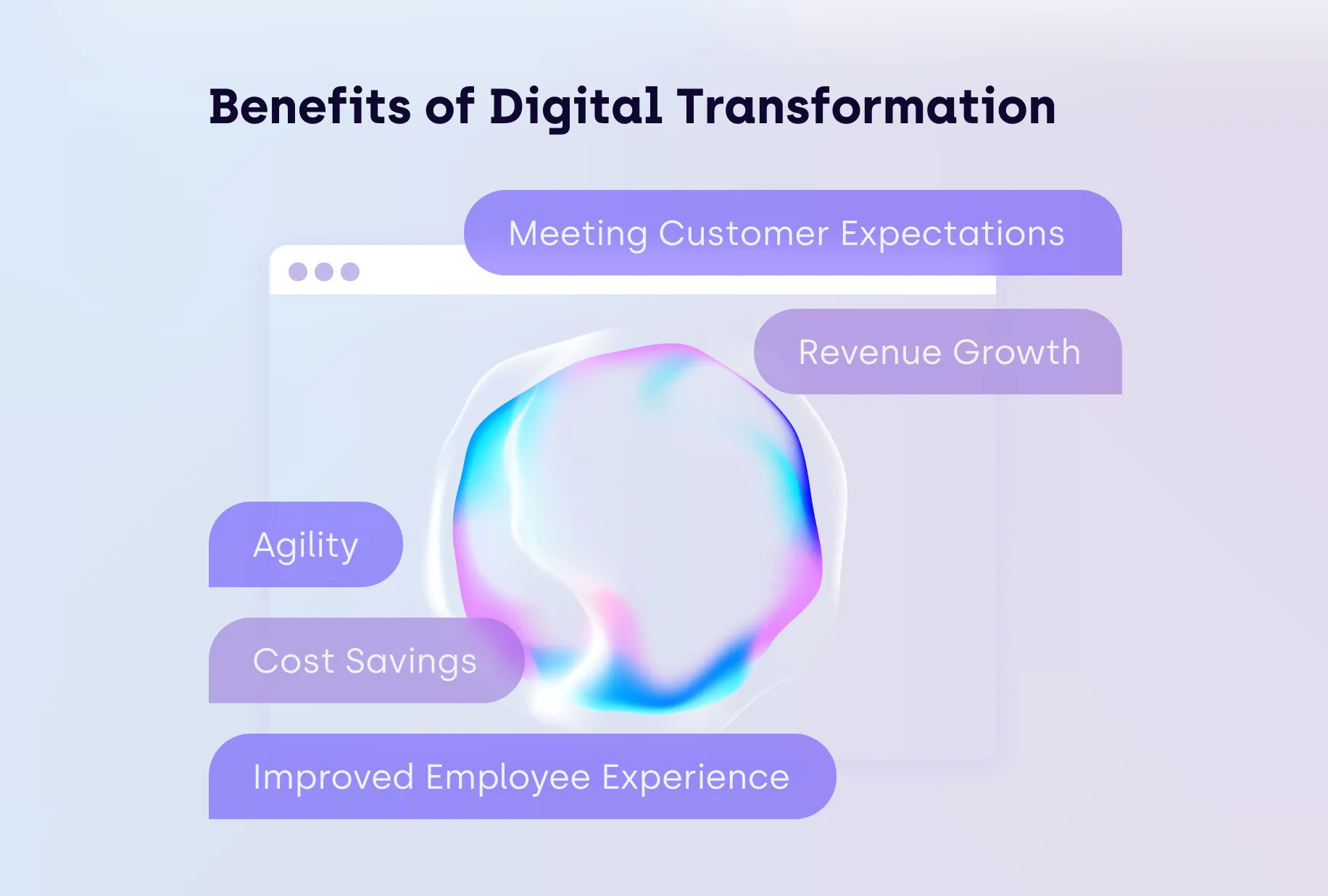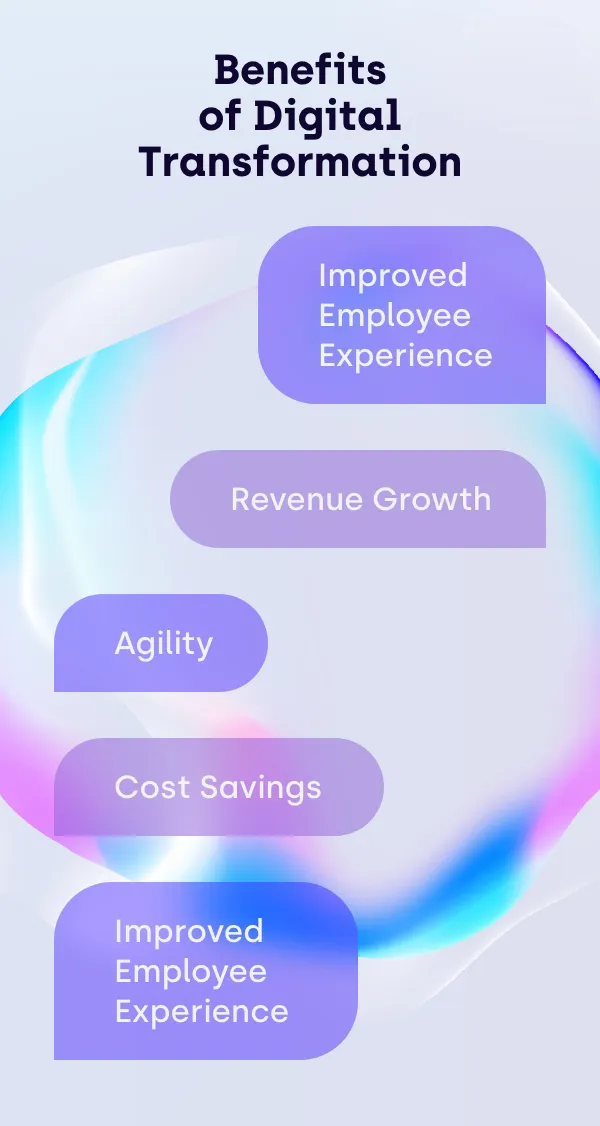
6 successful digital transformation examples

Digital transformation fueled by new technology is a hot term that’s constantly buzzing around: but what does it mean for a company, and how does it impact its operations and performance?
Successful examples of digital transformation across industries show that it’s not a passing fad, but rather when it’s executed properly, it brings a significant, long-lasting, and meaningful impact for companies. Digital transformation is the stepping stone for businesses from all avenues to building sustainable and evolving organizations.
The success stories stream from all types of industries, but here we will focus on six shining digital transformation examples: marketing, sales, banking, retail, manufacturing, and healthcare.
Let’s dive into the depths of digital transformation strategy and how it ameliorates the whole functioning of businesses in these six fields.
What is digital transformation?
First, let’s define what digital transformation means — and what it’s not.
Digital transformation vs. digitization
A common confusion is thinking that digital transformation simply equals a business's digitization process.
While digital transformation includes both digitization and digitalization, it goes far beyond those two terms.
With digitization, your company moves from analog to digital — converting paper documents into digital files and similar examples. It’s an indispensable step to making an organization operate effectively in the digital age.
Next comes digitalization. It uses the basis of digital files but builds upon this by introducing automation of digital processes and optimization of workflows. Digitalization can bring an immense boost in productivity and efficiency.
And then the real deal — digital transformation. It entails a complete overhaul of the way an organization functions.
The process is comprehensive and can be rather complex because it aims to reimagine the operations of a business and to innovate its company culture along with all processes, workflows, and overall vision.
Benefits of digital transformation
Digital transformation is a serious step in the development of a business that requires substantial human, financial, and time resources.
Yet it’s the most meaningful and beneficial choice that a company can make. In fact, the price of not implementing digital transformation turns out to be much higher than the considerable investment of implementing it.
But let’s consider the benefits of digital transformation in detail. Digital transformation initiatives help you:


Meet customer expectations
We live in a digital world, and your customers are an active part of it. Offering a high-quality customer experience is thus essential for your company’s competitiveness and performance. Embracing a customer-centric approach to developing and delivering your goods or services is the path to achieving that.
This may take different shapes and forms, but some common examples of digital transformation include collecting and analyzing client data to provide better services, using chatbots for constant customer support, improving the user’s journey within your digital assets, and the like.
Save on operational costs
Archaic legacy systems are often dragging companies’ development, requiring high maintenance costs and creating difficulties in updating and innovating. Using new digital solutions and replacing old systems helps save on all these costs. At the same time, new IT infrastructure directly contributes to process optimization, internal communication improvement, and well-informed decision-making.
Grow revenue
The digital innovation process not only reduces costs but also feeds into an increase in revenue. The optimization of internal processes and automation help boost the productivity of your team, so they can get more ‘real’ work done. At the same time, better products and services, as well as improvement in customer communication, bring about higher customer satisfaction, so you can keep old clients and attract new ones. All of this, naturally, leads to higher profits.
Achieve agility
In today’s fast-changing business landscape, being quick and flexible is imperative. Novel digital solutions and agile processes allow organizations to adapt in faster and less painful ways to the constantly evolving realities of the market. This is paramount for staying surviving and thriving as a business, as well as for keeping a competitive advantage in oversaturated industries.
Create a thriving company culture and improve the employee experience
Gone are the days when employees were just workers — today, business leaders realize that employees are the backbone of a company’s success. Employee experience has thus become essential for retaining the best talent and for maximizing people’s performance within a business. Digital transformation helps organizations create a good environment for their teams.
Best digital transformation examples
There’s barely an industry that hasn’t benefited from digital transformation in the last decade. Here are six fields that have been particularly fortunate - with the best examples of digital transformation.
Marketing
Marketing has grown exponentially due to digital transformation's novel tools and opportunities.
It’s difficult to know where to start in listing the numerous platforms and tools that fuel the growth and success of digital marketing companies. Some of the main ones include digital asset management (DAM), product information management (PIM), marketing resource management (MRM), content management systems (CMS), customer relationship management (CRM), marketing automation, and personalization.
Depending on their exact focus, digital marketing businesses use a mixture of these tools to cater to their clients’ needs, grow revenue, and deliver stronger digital marketing campaigns.
What Is Marketing Automation?
Many digital marketing tasks today are repetitive, and some are super complex due to the massive amounts of digital consumer data that must be analyzed and made sense of.
Marketing automation offers a viable solution for automating repetitive tasks, thus saving employee time and optimizing internal processes. With automation, marketing experts also can achieve an unseen level of data analysis that provides valuable insights into customer behavior and market patterns.
Sales
In the field of sales, digital transformation is bringing unseen changes.
Customer data, customer journey tracking, improvement, customer relationship management, and AI-driven sales techniques are just some of the innovations fueling sales teams' performance across the globe. Social selling strategies executed in partnership with marketing teams are bringing great results too.
A great example of sales is how IKEA transformed its business from physical stores only to a great hybrid of online and brick-and-mortar sales. Through its digital transformation, the giant managed to connect its online and physical interactions with customers.
Banking
Financial institutions have also gradually adopted digital transformation, which has led to immense changes in how clients use financial services.
Some of the new ways that customers are now used to include mobile banking, cash apps, cash airdrops, and cardless payments. They are becoming the preferred method for people to operate with their money — almost completely replacing the need to go to a physical bank location.
The top digital transformation examples in banking include Capital One and J.P. Morgan. Capital One has turned into a software leader with more than 500 AI patents in financing. On the other hand, J.P. Morgan has set up the virtual Onyx Lounge in Decentraland, a popular blockchain-based metaverse.
Retail
From digital marketing platforms and voice ordering to cloud systems and machine learning — businesses in retail are employing all possible digital solutions to drive their innovation and cater to their customers.
Some good digital transformation strategy examples in retail include Walmart and Best Buy. Walmart uses a hybrid model of online and physical shops, employing machine learning, digital marketing, and cloud infrastructure. Best Buy has embraced an elaborate digital marketing model using customer insights to offer a high level of personalization.
Manufacturing
In manufacturing, digital transformation has brought companies new methods for production, as well as for supply chain management and logistics.
On the production side, technologies like 3D printing are being used with all industrial materials like metal, plastics, and more. As for supply chain improvement, companies are employing predictive analytics to reduce operational and maintenance costs, decrease energy and water use, and improve performance.
Healthcare
While digital solutions in healthcare are adapted slowly, they are already changing how healthcare practitioners and institutions communicate with and provide services to patients.
Good examples of digital transformation include real-time healthcare monitoring, digital patient portals, and online medical appointments. Some institutions have also adopted Virtual Reality (VR) to offer patients pain reduction, simulations, and faster recovery.
As noted, the adoption process is more careful since there are privacy considerations regarding patient data, but still, the new solutions are now becoming ubiquitous.
What does successful digital transformation mean?
Success in implementing digital transformation means different things for different businesses and in different industries, all based on the clever use of digital technologies.
But the common denominator of successful transformation for all organizations, regardless of their field, is that when they get digital transformation right, they are able to achieve higher efficiency, better productivity, improved customer experience, cost savings, revenue growth, and talent retention.
Master your digital workplace transformation with Resolute Software
With rich experience behind our backs, we have helped numerous companies in many different industries successfully undertake and complete their digital transformation journey. The winning digital transformation examples are numerous -- from finance to healthcare.
Ready to learn how Resolute Software can contribute to your organization’s digital transformation efforts? Get in touch today.
FAQs
The four areas of digital transformation include the transformation of the business model, maximizing the benefits of digital data and analytics, optimizing digital operations, and improving customer experience.
The brightest examples of digitalization that feed into digital transformation are those companies that manage to use the optimization of business processes and the power of digital tools to drive a wholesome and sustainable innovation across the whole organization — from employee to customer.
David Rogers coins five digital transformation domains: Customer, Competition, Data, Innovation, and Value.
Alternatively, the five domains can be defined as the transformation of business models, automation and process optimization through digital technology, product and services innovation, employee empowerment and engagement, and customer experience.
As successful digital transformation examples show, the main goal of digital transformation is to allow an organization to achieve its full potential through implementing not only digital technology but also through the optimization of processes, the wholesome rethinking of its functioning, and revolutionizing of its company culture.





